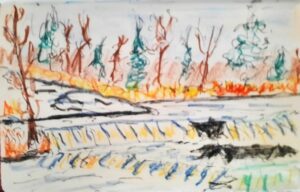Jody Porter practised compassionate journalism

By Maurice Switzer
Jody Porter may have looked physically frail, but she was journalistically fearless.
The deeply-entrenched anti-Indigenous racism that is rampant in both the alleyways and corridors of power in Thunder Bay is common knowledge across Canada these days, but a decade ago, the determined CBC Radio reporter’s voice seemed to be the only one publicly calling it out.
“Investigative journalism digs deeper when it is combined with compassion,” she wrote on her Twitter feed, and that heartfelt approach to newsgathering undoubtedly contributed to a degree of personal stress that manifested itself in a cancer diagnosis in 2017.
The disease interrupted her job for three years, but she returned to her reporting – much of it dedicated to the barriers faced by Indigenous people in Northwest Ontario – with undiminished zeal.
Jody’s deep humility became as legendary among colleagues as her widespread reputation as a crusading social justice journalist, and was typified by the last words her friends heard from her in a moving message they received on the morning of July 19 – her 50th birthday.
“Sorry for the impersonal nature of this e-mail. You’re receiving it because you’re a good friend, and I wanted you to know that I have died, without putting too great a burden of individual contacts on my family.”
Jody’s learning journey as a self-described “Settler living on Robinson-Superior Treaty lands” was greatly impacted by her stint as a reporter and editor in Sioux Lookout for Wawatay News, a branch of the communications network launched to serve Nishnawbe Aski Nation communities.
“I visited First Nations and got the education I was so sorely lacking,” she wrote. “I began to cover stories from those communities: about homes with no drinking water, overcrowded houses full of illness and mould and grief. About reserves with no proper schools. About the Residential Schools, the last of which had only recently closed. My First Nations colleagues witnessed my distress, offered emotional support.”
When she landed a reporting job at CBC’s Thunder Bay radio station in 2000, she realized that she now had a platform to amplify those stories for a wider audience, sometimes even a national one.
Her new listeners would hear Jody’s reports about the trial of the young man who deliberately tossed a metal trailer hitch from his moving vehicle that struck 34-year-old Barbara Kentner of Wabigoon Lake Ojibway First Nation as she was walking in downtown Thunder Bay, and who died five months later from her injuries.
She admitted to “processing my own emotions while live tweeting the inquest into seven First Nations teens who died while attending school in Thunder Bay”. Over eight months in 2015, Jody sat through every day’s distressing testimony, unlike municipal councillors who didn’t bother to show up to hear about the extent of systemic racism in their city. The inquest findings and Jody’s reporting led to an ongoing series of inquiries and investigations into the conduct of police officers and civilian police commissioners.
When her cancer diagnosis forced her to step back from her reporting duties, Jody used the time to reflect and write about the vocation she had pursued since graduating from Centennial College’s journalism program. As devoted a practitioner of her craft as she was, she was also a vociferous critic of how she had seen it practised, even by her CBC employer.
In 2005, she received an honourable Debwewin Citation mention when the selection committee became aware that the volume of Jody’s reporting on Indigenous issues had met with resistance and criticism by her CBC supervisor. Named after the Anishinaabemowin word for “truth”, the awards were launched in 2002 by the Anishinabek Nation to honour excellence in storytelling about Indigenous issues.
She was the recipient of a full-fledged Debwewin Citation in 2013, the same year in which she received a prestigious Southam Fellowship from Massey College. During the year-long sabbatical – designed to provide journalists a period of reflection on their societal roles – she wrote and spoke about her concerns that, despite the best of intentions, the media industry may be guilty of offering their audiences only superficial glimpses into deep-rooted problems.
Her essay, “The Awfulness of News”, worried that the digitization of journalism “normalizes depersonalization, decreases social capacity for a peaceful future and eviscerates collective action towards reconciliation.” She did not want to be guilty of contributing to the “pity porn” that she felt had been opportunistically attached to Indigenous tragedies by celebrities and the Canadian media.
“Getting better from the CBC requires demanding more of it, and organizing campaigns to put pressure on it to achieve said goals. Giving the CBC undue praise, even if to defend it from right-wing critiques, does a disservice to the campaign.”
One of her industry honours – the Adrienne Clarkson Award – was not even primarily about Jody’s journalism, but for her “Common Ground Cafe” series that brought strangers together to discuss race relations in Thunder Bay. Participants were put at ease by their host’s beaming smile and hearty laugh.
Her resolve never deserted her, enjoying a family camping trip even as she received palliative care.
“If you’re looking for a way to say good-bye,” Jody’s last e-mail said, “I encourage you to go for a walk by the water.
“My family will be distributing my ashes in Lake Superior and I hope you’ll look for me on the shores of whatever water is close to you.
“I’ll be there.”

In a recent telephone conversation, Jody was delighted to hear that I was calling one of my favourite outdoor sketching locations “Jody’s Pond”, a pool where Duchesnay Creek pauses to collect its energy before roaring down a series of scenic waterfalls just west of North Bay.
She will be there.
May her Spirit be in a better place, and shine in the night sky with all the other stars.
About the Author
Maurice Switzer is a citizen of the Mississaugas of Alderville First Nation. He was proud to know Jody Porter as a friend and fellow journalist.


